
Jean Schwartz was a Hungarian-born Jewish American composer and pianist. He is best known for his work writing the scores for more than 30 Broadway musicals, and for his creation of more than 1,000 popular songs with the lyricist William Jerome. Schwartz and Jerome also performed together on the vaudeville stage in the United States; sometimes in collaboration with Maude Nugent, Jerome's wife, and the Dolly Sisters. Schwartz was married to Jenny Dolly from 1913 to 1921.

Alfred Bryan was a Canadian lyricist.

Lew Brown was a lyricist for popular songs in the United States. During World War I and the Roaring Twenties, he wrote lyrics for several of the top Tin Pan Alley composers, especially Albert Von Tilzer. Brown was one third of a successful songwriting and music publishing team with Buddy DeSylva and Ray Henderson from 1925 until 1931. Brown also wrote or co-wrote many Broadway shows and Hollywood films. Among his most-popular songs are "Button Up Your Overcoat", "Don't Sit Under the Apple Tree", "Life Is Just a Bowl of Cherries", "That Old Feeling", and "The Birth of the Blues".

Gustav Gerson Kahn was an American lyricist who contributed a number of songs to the Great American Songbook, including "Pretty Baby", "Ain't We Got Fun?", "Carolina in the Morning", "Toot, Toot, Tootsie ", "My Buddy" "I'll See You in My Dreams", "It Had to Be You", "Yes Sir, That's My Baby", "Love Me or Leave Me", "Makin' Whoopee", "My Baby Just Cares for Me", "I'm Through with Love", "Dream a Little Dream of Me" and "You Stepped Out of a Dream".
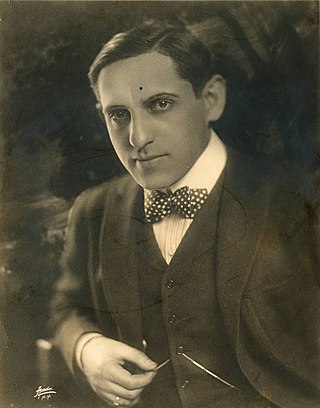
Gustave Edwards was an American composer, songwriter and film director. He also was a vaudevillian, organised his own theatre companies and was a music publisher.
Leigh Adrian Harline was an American film composer and songwriter. He was known for his "musical sophistication that was uniquely 'Harline-esque' by weaving rich tapestries of mood-setting underscores and penning memorable melodies for animated shorts and features."

"If You Were the Only Girl (In the World)" is a popular song, written by Nat D. Ayer with lyrics by Clifford Grey. It was written for the musical revue The Bing Boys Are Here, which premièred on 19 April 1916 at the Alhambra Theatre in Leicester Square, London. The song was originally performed as a duet between Lucius Bing, played by George Robey, and his love interest Emma, originated by Violet Loraine.
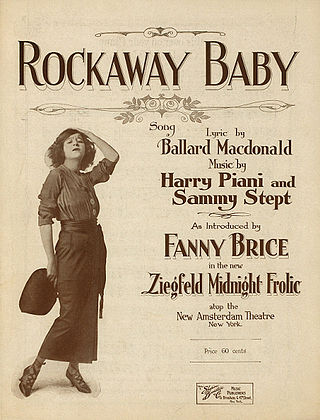
Samuel Howard Stept was an American songwriter who wrote for Broadway, Hollywood and the big bands. He became known simply as Sam Stept or Sam H. Stept – he rarely used his full middle name.
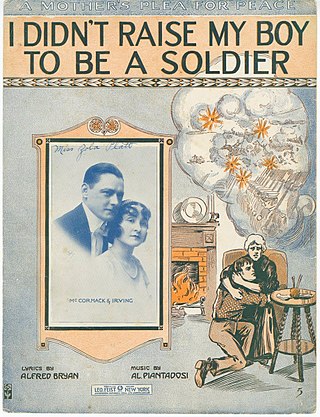
"I Didn't Raise My Boy to Be a Soldier" is an American anti-war song that was influential within the pacifist movement that existed in the United States before it entered World War I. It is one of the first anti-war songs. Lyricist Alfred Bryan collaborated with composer Al Piantadosi in writing the song, which inspired a sequel, some imitations, but also a number of scornful parodies. It was recorded by The Peerless Quartet in December 1914 and was a hit in 1915, selling 650,000 copies. Its expression of popular pacifist sentiment "helped make the pacifist movement a hard, quantifiable political reality to be reckoned with."
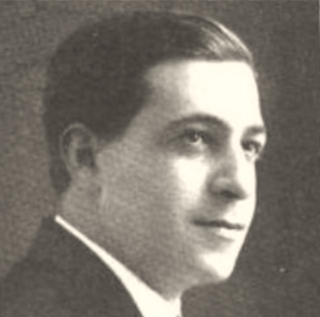
Al Piantadosi was an American composer of popular music during the heyday of Tin Pan Alley. He started out as a saloon and vaudeville pianist and rapidly flourished as a songwriter. For about ten years he was an independent music publisher.

Joan of Arc's Answer Song is a World War I song released in 1918. J.L. Lavoy is credited as the composer and lyricist. The song was published by J.L. Lavoy Music Publishers. It was written for both voice and piano. The lyrics are written in first person, and mentions the saint "Joan of Arc" once by name. The chorus addresses France specifically, and assures the country that America stands with them.

Soldier Boy is a World War I era song released in 1915. D.A. Esrom wrote the lyrics. Theodore Morse composed the music. Leo Feist, Inc. of New York, New York published the song. Artist Harry Lewis designed the cover art for the sheet music. On the cover, there are three cartoon soldiers. One has his head turned to kiss a woman behind him. The song was written for both voice and piano. It is told from the point of view of a woman who is proud of her soldier boy. She addresses the soldier directly in the chorus:
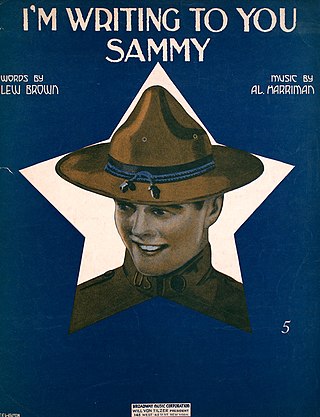
I'm Writing to You, Sammy is a World War I era song released in 1917. Lew Brown wrote the lyrics. Al Harriman composed the music. The song was published by Broadway Music Company of New York, New York. On the cover of the sheet music is a drawing of a soldier, from the shoulders up, inside of a star. Artist E.E. Walton designed the cover. The song was written for both piano and voice.

Uncle Sammy, Take Care of My Girl is a World War I song released in 1918. Betty Morgan wrote the lyrics. Jimmie Morgan composed the music. The song was published by F.J.A. Forster of Chicago. On the cover of the sheet music is a soldier in a trench, writing a letter. The smoke of the fire has a drawing of Uncle Sam reading the letter to a woman. There is also a photo of the lyricist and composer. Artist Dan Sweeney designed the cover. Another version of the cover shows a soldier in the upper right-hand side, writing a letter. In the lower left corner, Uncle Sam offers the letter to a woman. A photo of the lyricist and composer are also featured on the cover. It was written for both voice and piano.
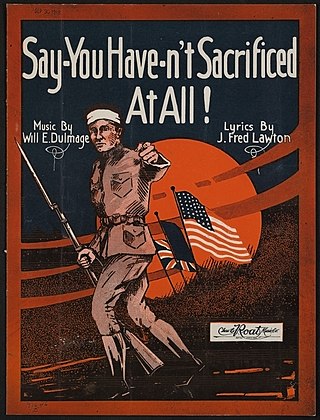
"Say, You Haven't Sacrificed at All! (March)", also written as "Say-You Haven't Sacrificed at All!" or "Say-You Have-n't Sacrificed at All!", is a World War I era song released in 1918. Most sources have attributed the role of composer to Will E. Dulmage and lyricist to J. Fred Lawton, as it is credited on the sheet music cover. One source has their roles reversed, and another source claims both composed the music. The song was published by Chas E. Roat Music Co. of Battle Creek, Michigan. On the cover is a soldier with a head wound, pointing. Behind him are British, French, and American flags. It was written for both voice and piano.
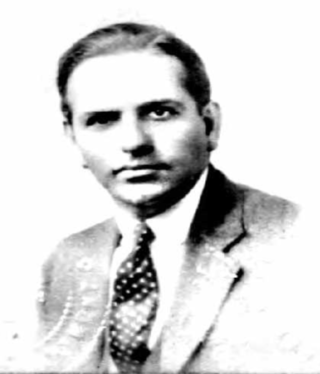
Anatole Friedland, also spelled as Anatol Friedland and Anato Friedland, was a composer, songwriter, vaudeville performer, and Broadway producer during the 1900s. He is most-known for composing songs with lyricist L. Wolfe Gilbert. Their most popular songs include, "My Sweet Adair" (1915), "Are You From Heaven?" (1917), and "My Own Iona" (1916).
Harold Dixon was an American composer, lyricist and publisher.

"When the 'Yanks' Come Marching Home" is a World War I era song released in 1917. William Jerome wrote the lyrics. Seymour Furth composed the music. It was published by A.J. Stansy Music Co. of New York City.

"After the War Is Over Will There Be Any 'Home Sweet Home'?" is a World War I–era song released in 1917. Elmer J. Pourmon and Joseph Woodruff wrote the lyrics. Harry Andrieu composed the music. The cover lists Woodruff as composer and Pourmon as lyricist. Contradictory information inside the sheet music lists Harry Andrieu as composer, and Woodruff and Pourmon as lyricists.
"A Soldier Speaks" is a song from 1944, with music and lyrics by Peter DeRose, and published by Robbins Music Corp.

















